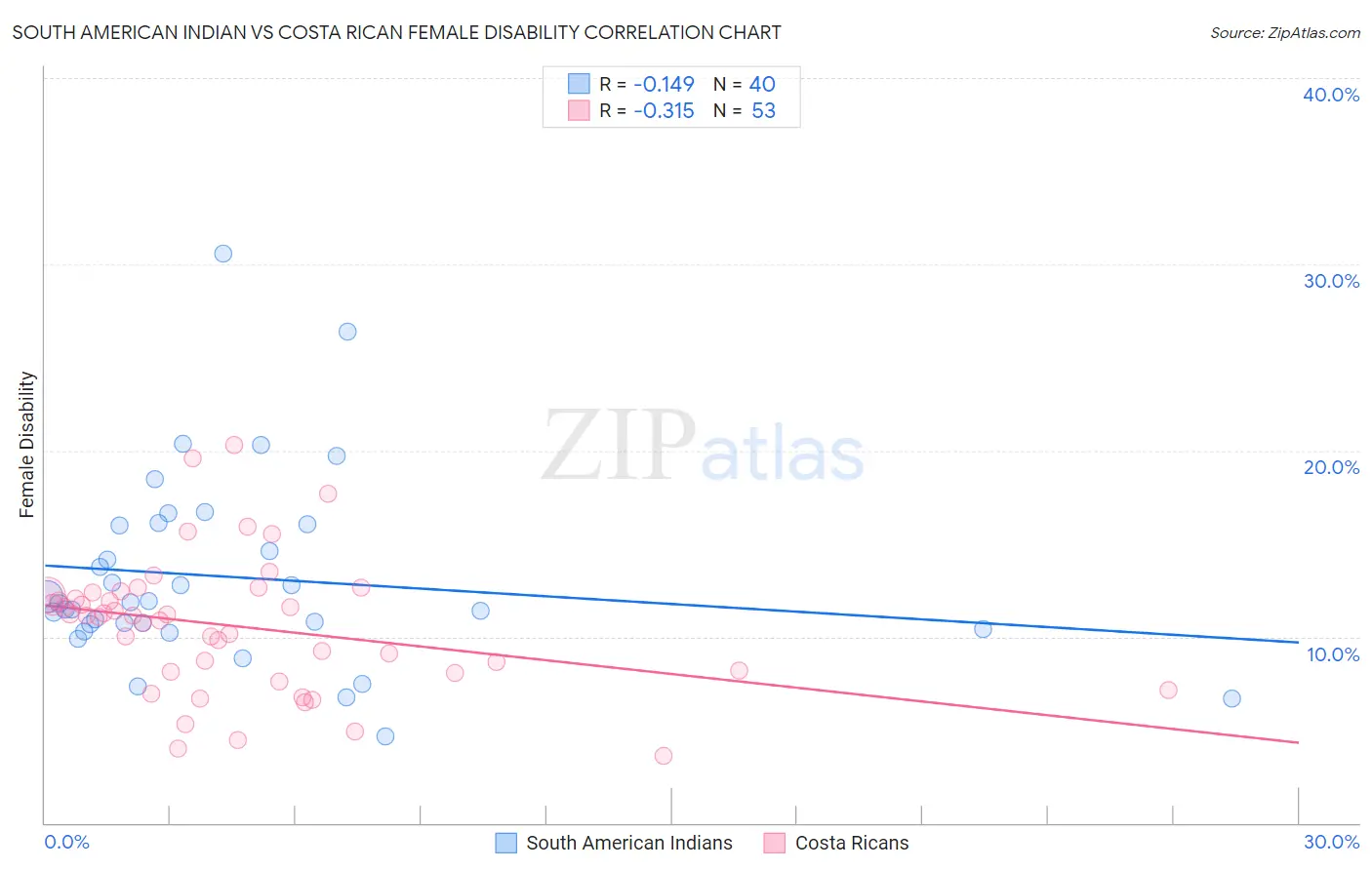South American Indian vs Costa Rican Female Disability
COMPARE
South American Indian
Costa Rican
Female Disability
Female Disability Comparison
South American Indians
Costa Ricans
11.8%
FEMALE DISABILITY
95.8/ 100
METRIC RATING
127th/ 347
METRIC RANK
11.7%
FEMALE DISABILITY
98.1/ 100
METRIC RATING
111th/ 347
METRIC RANK
South American Indian vs Costa Rican Female Disability Correlation Chart
The statistical analysis conducted on geographies consisting of 164,561,575 people shows a poor negative correlation between the proportion of South American Indians and percentage of females with a disability in the United States with a correlation coefficient (R) of -0.149 and weighted average of 11.8%. Similarly, the statistical analysis conducted on geographies consisting of 253,556,053 people shows a mild negative correlation between the proportion of Costa Ricans and percentage of females with a disability in the United States with a correlation coefficient (R) of -0.315 and weighted average of 11.7%, a difference of 0.78%.

Female Disability Correlation Summary
| Measurement | South American Indian | Costa Rican |
| Minimum | 4.7% | 3.6% |
| Maximum | 30.6% | 20.3% |
| Range | 25.9% | 16.7% |
| Mean | 13.2% | 10.6% |
| Median | 11.8% | 11.1% |
| Interquartile 25% (IQ1) | 10.5% | 8.1% |
| Interquartile 75% (IQ3) | 16.0% | 12.3% |
| Interquartile Range (IQR) | 5.5% | 4.2% |
| Standard Deviation (Sample) | 5.1% | 3.6% |
| Standard Deviation (Population) | 5.1% | 3.6% |
Demographics Similar to South American Indians and Costa Ricans by Female Disability
In terms of female disability, the demographic groups most similar to South American Indians are Immigrants from Latvia (11.8%, a difference of 0.040%), Macedonian (11.8%, a difference of 0.070%), Immigrants from Europe (11.8%, a difference of 0.10%), Immigrants from Italy (11.8%, a difference of 0.17%), and Russian (11.8%, a difference of 0.20%). Similarly, the demographic groups most similar to Costa Ricans are Immigrants (11.7%, a difference of 0.020%), Soviet Union (11.7%, a difference of 0.020%), Immigrants from Bangladesh (11.8%, a difference of 0.12%), Immigrants from Belarus (11.8%, a difference of 0.13%), and South African (11.8%, a difference of 0.16%).
| Demographics | Rating | Rank | Female Disability |
| Immigrants | Immigrants | 98.1 /100 | #109 | Exceptional 11.7% |
| Soviet Union | 98.1 /100 | #110 | Exceptional 11.7% |
| Costa Ricans | 98.1 /100 | #111 | Exceptional 11.7% |
| Immigrants | Bangladesh | 97.8 /100 | #112 | Exceptional 11.8% |
| Immigrants | Belarus | 97.8 /100 | #113 | Exceptional 11.8% |
| South Africans | 97.7 /100 | #114 | Exceptional 11.8% |
| Brazilians | 97.7 /100 | #115 | Exceptional 11.8% |
| Immigrants | Morocco | 97.6 /100 | #116 | Exceptional 11.8% |
| Immigrants | Eastern Europe | 97.2 /100 | #117 | Exceptional 11.8% |
| Immigrants | Nigeria | 97.2 /100 | #118 | Exceptional 11.8% |
| Immigrants | Uganda | 97.2 /100 | #119 | Exceptional 11.8% |
| Immigrants | Kazakhstan | 97.0 /100 | #120 | Exceptional 11.8% |
| Immigrants | Netherlands | 96.9 /100 | #121 | Exceptional 11.8% |
| Immigrants | North Macedonia | 96.8 /100 | #122 | Exceptional 11.8% |
| Immigrants | Croatia | 96.7 /100 | #123 | Exceptional 11.8% |
| Russians | 96.5 /100 | #124 | Exceptional 11.8% |
| Immigrants | Italy | 96.4 /100 | #125 | Exceptional 11.8% |
| Immigrants | Europe | 96.2 /100 | #126 | Exceptional 11.8% |
| South American Indians | 95.8 /100 | #127 | Exceptional 11.8% |
| Immigrants | Latvia | 95.6 /100 | #128 | Exceptional 11.8% |
| Macedonians | 95.5 /100 | #129 | Exceptional 11.8% |